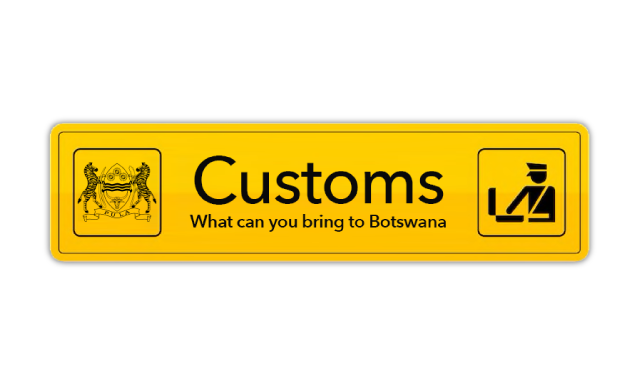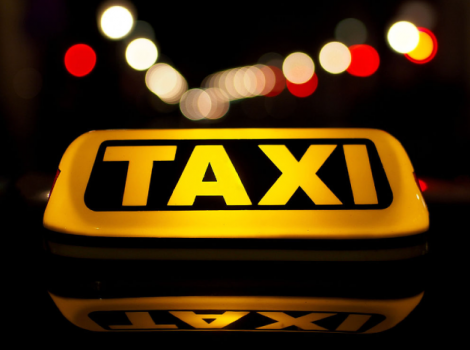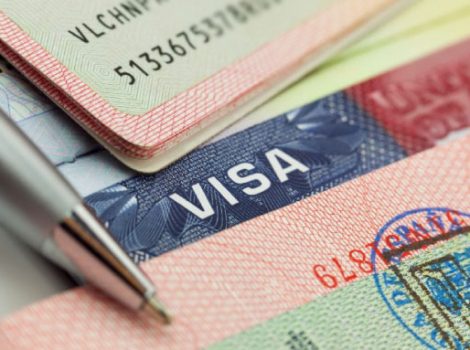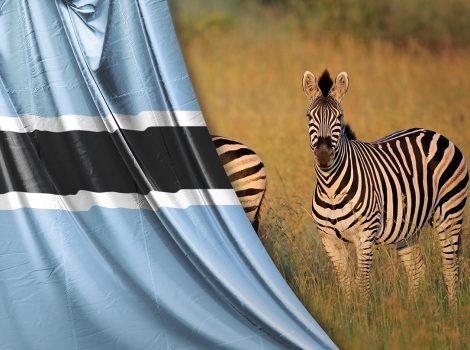
This article may strike some as a weird one for YourBotswana. However, we receive a very interesting variety of questions that are quite often far beyond our scope of knowledge. Some of those questions are about what you can bring into Botswana and even though we keep referring our readers to the Botswana Government website and we’ve run a series of slides stating what YourBotswana can and can’t do, the questions keep coming.
Not to say we’re complaining; in fact, we’re grateful for the visits and email. However, we really aren’t able to address all the questions. Luckily, we are able to run the complete guide on what you’re allowed and not allowed to bring into Botswana.
Customs
If you are visiting Botswana, you are required to declare all goods in your possession to a Customs official on duty on a baggage declaration document called, Form J. Customs has a duty to protect Botswana from illicit goods being brought into the country. To do this, checks may be made on travellers and their baggage. If you are stopped and your baggage is checked, please co-operate because it’s not to say you’re suspected to have done anything wrong. The officers and Botswana Government pledge to treat you courteously and professionally.
Baggage Declaration
When making baggage declarations, whether verbal or written, you must ensure that you declare all goods in your possession as well as their correct values. Failure to declare goods and their correct values can lead to the seizure of your goods and can result in criminal prosecution or the imposition of severe penalties of up to three times the value of the goods.
What You Must Declare
- All goods acquired outside Botswana in your possession, including items you received as gifts, such as wedding or birthday presents.
- Repairs or alterations to any items or vehicle you took abroad and then bring back, even if the repairs/alterations were performed free of charge.
- Items you bought in any duty-free shop including those bought duty-free on aircraft or ship.
- Items you are bringing home for someone else.
- Items you intend to sell or use in your business.
To Avoid Delays with Baggage Declarations
- Please produce all receipts and sales slips for goods purchased outside Botswana.
- If you are unsure of the goods and their value, which you should declare, ask for assistance from the customs officer.
Duty-Free Allowances
Customs duties are not charged on the following goods imported as accompanied or unaccompanied passengers’ baggage:
Personal effects, sporting and recreational effects, new or used –
- Imported by non-residents of Botswana for their own use;
- Imported by persons making a bonafide change of residence to Botswana;
- Exported by residents of Botswana for their own use whilst abroad and subsequently re-imported by such residents. The goods must be identifiable as those exported from Botswana.
The following articles and consumables (excluding any goods the importation of which is prohibited), declared at the point of entry into Botswana and not imported on behalf of other persons or by way of trade, may be admitted free of duty and, where applicable, Value Add Tax (VAT):
- Wines – 2 litres
- Spirituous and other alcoholic beverages – 1 litre
- Cigarettes – 200
- Cigars – 20
- Cigarettes or pipe tobacco – 250gms
- Perfume – 50ml
- Toilet water – 250ml
- Other new or used goods of a total
Value not exceeding (from outside SACU) – 3000 UA*
Other new or used goods of a total
Value not exceeding (from SACU) – 500 UA*
*UA is equivalent to One South African Rand.
Additional goods imported from outside SACU, new or used of a total value not exceeding 12 000 UA* per person, excluding the consumable items detailed above, are admissible at a flat rate of 20% if the owner so elects.
Please Note! Duty will be payable at the applicable rates where travellers import goods exceeding the above allowances. Travellers importing goods for business or commercial purpose will not qualify for the above allowances. The concession for new and used goods specified above do not apply to such goods imported by residents of Botswana returning after an absence of less than 48 hours; With the exception of those relating to tobacco and alcoholic products, the concessions may be claimed by children under the age of 18 years, whether or not their parents or guardians accompany them, provided the goods are for use by the children themselves.
Prohibited and Restricted Goods
Certain goods are prohibited or restricted to protect public health, domestic plant and animal life or the environment. The government has been entrusted with enforcing laws for other government agencies relating to the prohibition and restriction of such goods. It is not possible to list all prohibited and restricted goods. If you are in any doubt as to whether the importation of other goods is prohibited or restricted, please contact the nearest customs office in Botswana before travelling outside the country.
Prohibited Goods
The importation of, among other things, the following goods into Botswana is completely prohibited. It is illegal to be in possession of prohibited goods and may result in seizure and prosecution. These include:
- Narcotic, habit-forming drugs and related substances in any form.
- Military firearms, ammunition and explosives
- Indecent and obscene material such as pornographic books, magazines, films, videos, DVDs and software
Restricted Goods
These are goods which you cannot import without authority such as a licence or a permit. Further details regarding restrictions on the importation of agricultural products can be obtained from the Director of Animal Health and Production, Private Bag 0032, Gaborone and the Director of Crop Production and Forestry, Private Bag 003, Gaborone.
The following consumer goods may be imported for private use without an import permit provided they do not exceed the maximum allowable quantities.
| Products | Maximum Quantity |
| Red meat, goat/lamb Poultry meat Tinned poultry meat Eggs Fresh milk Maize and maize products Wheat Pulses (beans, peas, lentils) Sorghum and sorghum products Cabbage Onions Potatoes Oranges Tomatoes Choumollier Rape Spinach Bread loaves |
25 kg per family 5 kg per person 20 kg per person 36 eggs per person 2 litres per person 25 kg per person 25 kg per person 25 kg per person 25 kg per person 1 bag per person 1 bag per person 1 bag per person 1 bag per person 1 box per person 2 kg per person 2 kg per person 2 kg per person 6 per week |
The regulations on importing meat and meat products change frequently because they are based on disease outbreaks in different countries. As such, always ask your nearest customs office before importing meat and meat products.
Domestic Pets
Importing animals is closely regulated for public health reasons and also for the well being of the animals. Domestic pets and livestock may be imported subject to animal health restrictions. Details can be obtained from the Director of Animal Health and Production, Private Bag 0032, Gaborone.
Note: A valid Certificate of Identity, Rabies Vaccination and Movement Permit issued in Lesotho, Malawi, South Africa, Swaziland, Namibia or Zimbabwe will be accepted at the time of importation into Botswana.
Plants and Soil
These may be imported subject to plant health restrictions. Further details can be obtained from the Chief Agricultural Research Officer, Private Bag 0033, Gaborone.
Please Note! South African transit permits may also be required in respect of plants shipped through South Africa. Details may be obtained from the Director of Plant Control and Quarantine, Private Bag X179, Pretoria, South Africa.
Soil is considered the loose surface material of the earth in which plants, trees and scrubs grow. In most cases, the soil consists of disintegrated rock with an admixture of organic material and soluble salts. The importation of soil is prohibited unless accompanied by an import permit from the Director of Crop Production and Forestry, Private Bag 003, Gaborone.
Motor Vehicles and Boats
No boat, mokoro or aquatic apparatus may be imported into Botswana unless the owner is in possession of an Import Permit issued by Department of Water Affairs.
Non-residents visiting Botswana and coming from a country outside the Southern African Common Customs Area for a limited period are normally required to produce a carnet, triptyque or bill of entry (any duty liability thereon being secured by bond or cash deposit) in respect of their motor vehicles.
Please note! The Southern African Common Customs Area comprises Botswana, Lesotho, South Africa, Swaziland and Namibia.
A simplified system involving a Temporary Import Permit is applied to motor vehicles, the bona fide property of a resident of Malawi, Mozambique or Zimbabwe and a similar system is applied reciprocally between Zambia and Botswana.
Residents of Botswana are not allowed to drive or use foreign registered vehicles in Botswana for over 14 days after importing such a vehicle. If you intend to do so, please contact your nearest customs office for advice. Should you be found in possession of a foreign registered vehicle, severe penalties including the seizure of vehicles may be imposed.
Source: gov.bw




Was returned by custom official as i was carrying additional fuel for my trip to Harare, Skilpad border official could not permit me to enter, suprisinly a month earlier was let to cross, why is there no consistency
Can I bring cooked vacuum sealed pork ribs and other cooked meat a chicken products
Re duty payable on alcohol in excess of the duty free amount, I have searched the internet and can’t find a clear indication of what the percentage(s) is/are?
We are travelling in the Tuli Block where there are no shops so I have to bring drinks for our 6 night stay, please can you let me know.
Can I bring a birthday cake into Botswana
can i bring mutton meat in for own consumption on holliday from SA